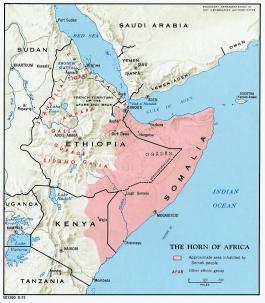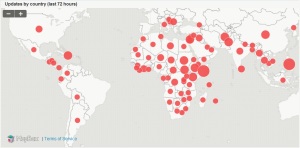It has been nearly a month since I returned from Mogadishu with a delegation of NGOs from the UK. Parts of our activities included:
- Assessing the humanitarian situation by visiting IDP (Internally Displaced People) Camps and Hospitals
- Getting firsthand experience so as to carry out awareness activities in the UK
- Arranging meetings with local civil society organisations and Muslim INGOs
- Taking part in a Rain Prayer organised by several Civil Society Organisations
I have now been twice to Mogadishu since the month of August.
On my first visit, I assisted Loutfi and Wassim from Islamic Relief Worldwide in collecting data on water that would then be used to mobilise Muslim Donors and NGOs on the need to focus on long term access to Water in Somalia. I was happy to hear that this resulted in the OIC organising a conference entitle “Water for Life” in Egypt where NGOs offered to drill 582 boreholes.
On the second visit, we organised meetings with Muslim INGOs and local NGOs. Two of our trustees, Othman Moqbel (Human Appeal International) and Dr. Hany El-Banna were part of these conversations. We recognised the fact that it would be difficult for International NGOs to scale up their activities in Somalia given the current political context and that it would be better to work with local partners. Working with local partners also meant taking the responsibility and investing in building their capacities.
We were accompanied during this trip by a group of Somalis from the UK Diaspora, from the Somali Relief and Development Forum, who had not been to Somalia for over 20 years and in some cases had never been to Somalia before. Three ladies in particular: Rahma, Samira and Zahra.
 The people living in IDP camps were mainly women and children. The accounts they gave to Rahma, Samira and Zahra, were things they would have never been able to say to anyone else. Cases of rape and other serious issues that no one dares to talk about. These women spoke, because the people they spoke to were women, Somalis and persons they felt they could trust.
The people living in IDP camps were mainly women and children. The accounts they gave to Rahma, Samira and Zahra, were things they would have never been able to say to anyone else. Cases of rape and other serious issues that no one dares to talk about. These women spoke, because the people they spoke to were women, Somalis and persons they felt they could trust.
I had also noticed limited visibility from certain NGOs as compared to Muslim NGOs. This may be due to security concerns, I don’t know. It seems that, in Somalia, new humanitarian actors are coming to light, thus challenging the traditional “Western” model of humanitarianism which may have failed in this part of the world.
We ended up our trip with a Rain Prayer. The Rain arrived on that same night. A blessing from Allah.
By Abdurahman Sharif




 In the two months that I have been working in the charity sector I feel proud and honoured that I have done something valuable with my time. Knowing that every blog, letter and Facebook update that I do will somehow to try to persuade someone to give from their time or money to help the less fortunate. My time that I spent with both the charity organisations I was with has been a big help to me in such a way that will benefit me in my professional career.
In the two months that I have been working in the charity sector I feel proud and honoured that I have done something valuable with my time. Knowing that every blog, letter and Facebook update that I do will somehow to try to persuade someone to give from their time or money to help the less fortunate. My time that I spent with both the charity organisations I was with has been a big help to me in such a way that will benefit me in my professional career.